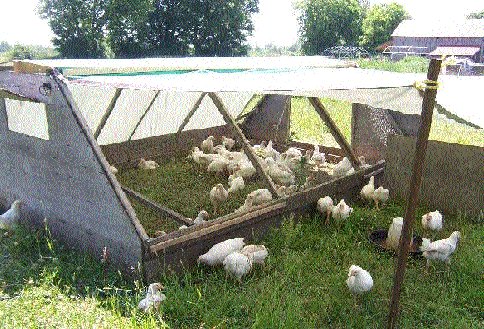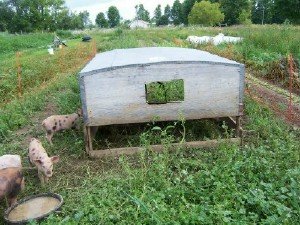How to live cheap (but still eat very well)
In figuring out how to live cheap, there is at least one thing you DON'T want to skimp on; good, healthy food But is possible to learn how to live frugally while still eating healthy, nutritious meals. The answer is simple: grow your own organic meats and veggies!
Even without a lot of experience, it's possible to provide much of your own food with access to a small piece of land. Note that you don't need to own the land; you just need to get access to it.
How to Live Cheap Lesson 1 - Finding Land
Here’s the good news: you don’t have to own a farm to be a farmer! In fact, there is a successful young couple in our area that operates a 2-acre market garden serving 77 families, on land they rent from another farmer.
The rent they pay is very reasonable, and as part of the deal they get access to a tractor and tillage equipment. In the meantime, this farming couple live in an apartment in a small town about 10 km. away
You may not need this much land, but in most rural areas, there is good land that is underused. Put the word out to your neighbours that you are looking for a small plot for a garden, and perhaps to raise a few chickens or a pig (more about that later). If you follow the plan on the rest of this page, you would look for about 1/2 acre.
You can also find land by driving around and looking for fields that appear un-worked, without animals grazing. Ask local farmers if they might be interested in renting you a small plot; They may even take a share of the veggies or some meats you raise in exchange.
Your rented land needs four things:
1 – full sunshine
2 – access to water for irrigation
3 – soil in reasonable condition
4 – and ideally, access to electricity so you can have coolers, and electric fence (for crop and animal protection).
You may also be able to negotiate use of farm equipment as part of the deal, or pay the farmer to help till the garden for you.
How to Live Cheap Lesson 2 - Bootstrapping your Personal Mini-farm
OK, you've found some land cheap; now you need to get the wherewithal together to grow a garden. A thriving garden will be the centerpiece of your personal farm.
But if you're broke, (or just thrifty), how do you acquire the equipment and supplies you need for a garden. The answer is, the 'bootstrap' approach.
Here's how this works; approach a few friends, neighbours, co-workers, hockey buddies, etc and tell them you are creating a mini-farm capable of providing fresh, healthy, DELICIOUS, veggies and meats to just a few local families. Tell them if they hurry, they can get on the list to share in these goodies.
Then you solicit funds from these lucky participants to help pay for the start-up; some of them may even want to pitch in on the work. (Maybe they want to learn how to live cheap, too). Their contribution buys them a share of the goodies from the garden, and first choice of the other things you will raise. Use their money to buy your equipment and supplies, and get started!
How to live Cheap Lesson 3 - What to Grow
I've already suggested that your organic garden is a key element in how to live frugally; but it's tough to live on just garden produce alone (I know some folks do, but not most of us.)
So, what other easy to grow and productive crops could you have on you little piece of land? The two that have always worked well for us is raising pastured pork and pastured poultry.
These are good livestock animals to start with, particularly if you have never raised animals before. You will buy day-old chicks from a hatchery, and weaned piglets from a local farmer, so there is no need for breeding stock.
A batch of chickens raised on pasture and organic grain takes about 12 weeks to get up to 'roaster' size (about 5 lbs); your piggies will take around 20 weeks to get to a market weight of about 220-250 lbs. So you can start these livestock animals, and have them finished and in your freezer in one season.
Raising livestock seasonally, in warm weather, means you can do it on the cheap; you don't need to spend a lot of money on housing and equipment. The Movable Coop I use (also designed by me, he said modestly) cost me about $150; it can house 75 meat birds comfortably. I usually put three 'batches' through it each year in fact, starting in April and finishing the last batch in October.
My 'pigloo' is a homemade cap for a pickup truck; I bought it at a farm auction for two dollars! But it works just fine to provide shade and shelter for up to 8 piggies.

The New Terra Farm cheap chicken coop

The two-dollar 'Pigloo'
How to Live Cheap Lesson 4 - The Payback
The economics of raising pigs and chickens is such that, if you sell 2/3 of what you grow, yours is free! In other words, raising three pigs and selling two will put 150 lbs. or so of delicious, organic, pasture-raised pork in your freezer for free.
Raise 75 meat chickens and sell 50, and you have 25 free chicken dinners (more, actually, since a 5 lb bird should make two meals.)
How about the time involved? Here's comparison for you; Suzie and I currently each work about a 40-hour week in our garden, to feed 45 families (plus us). We also have a part-time farm helper for about 20 hours a week. So that's a total of about 100 hours a week to run a garden for 45 families.
So,if you were growing for four or five families, I expect that could be managed in about 10 hours a week, or 1-2 hours a day. By the way, our system for raising chickens and pigs takes us about 10 minutes a day, plus about 20 minutes once a week to move the portable coop and pigloo.
In conclusion: That wraps up the lessons in how to live cheap. Given the above, it seems well within reach for just about anyone (with a little motivation) to learn how to live cheap. If you follow the above plan, you will get most of your families food for free; and it will be better and healthier than just about anything you can buy. What are you waiting for?
See also:
The One Acre Mini-Farm Plan
The Raised Bed Garden Plan
How to Raise Meat Chickens
How to Raise Pigs
Why my small farm needed a website (hint: I needed more income, and a way to retire.) Here's why your farm needs a website, too
Return to Home page from how to live cheap
